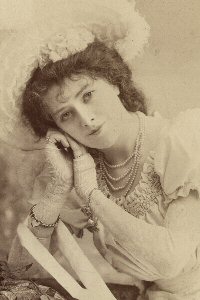
THE D'OYLY CARTE OPERA COMPANY
 |
| Isabel Jay as Mabel in The Pirates of Penzance |
Isabel Jay (1897-1902)
[Born Wandsworth, London, 17 Oct 1879, died Monte Carlo 26 Feb 1927]
Born into a well-known musical family, Isabel Emily Jay was giving musical recitals by age twelve and in 1895 entered the Royal Academy of Music, where (in July 1897) she became the first winner of the Gilbert R. Betjemann medal for operatic singing.That same month, after accepting a three-year contract with the D'Oyly Carte Opera Company, she made her first stage appearance at the Savoy singing Elsie Maynard in a one-week tryout during the first London revival of The Yeomen of the Guard.
She then went on tour, joining D'Oyly Carte Opera Company "B" (recently returned from South Africa) in August 1897 as principal soprano, singing Phyllis in Iolanthe, Yum-Yum in The Mikado, Elsie in Yeomen, and Princess Lucilla Chloris in His Majesty.In October, The Sorcerer replaced His Majesty in the "B" repertoire, withMiss Jay as Aline.She left the tour in December 1897 but returned in February 1898, taking up Phyllis, Yum-Yum, and Elsie again, and adding Mabel and Aline when The Pirates of Penzance and The Sorcerer were revived in March.
Company "B" was disbanded in June 1898, but by August Miss Jay had joined the main Company at the Savoy, where she pinch hit for both Emmie Owen as Gianetta and Ruth Vincent as Casilda in a revival of The Gondoliers.She appeared as the Plaintiff in Trial by Jury when Trial and The Sorcerer were revived (September-December 1898), and took the small part of Aloes in The Lucky Star (January-May 1899).During the June-November 1899 revival of Trial by Jury and H.M.S. Pinafore she was the Plaintiff again, except for several periods between July and November when she filled in for Ruth Vincent as Josephine in Pinafore.
Her big break came with Sullivan and Hood's The Rose of Persia.Sullivan had engaged American coloratura soprano Ellen Beach Yaw to sing the title role of Sultana Zubeydah, relegating Ruth Vincent to the relatively small part of "Scent-of-Lillies."Miss Vincent rebelled and left the Company.Within a fortnight of the November 29, 1899, opening, Miss Yaw had been sacked by Mrs. D'Oyly Carte and Isabel Jay was promoted from "Blush-of-Morning" to the Sultana.She would be the leading soprano at the Savoy until she left the Company in March 1902.After The Rose of Persia she appeared as Mabel in The Pirates of Penzance (June-November 1900), was Patience in the first London revival of Patience (November 1900-April 1901), created the roles of Lady Rose Pippin in The Emerald Isle (April-November 1901) and the Gipsy Woman in Ib and Little Christina (November 1901), and took Phyllis (her favorite role) in the first London revival of Iolanthe (December 1901-March 1902).
After a break of 19 months, in which she was married and a daughter was born, she embarked on a second career in musical comedy, starring in eleven West End shows over a period of seven-and-a-half years (October 1903-April 1911).These included such hits as A Country Girl, The Cingalee, Veronique, The White Chrysanthemum, Miss Hook of Holland, My Mimosa Maid, Dear Little Denmark, and The Balkan Princess.She formally retired from the stage in April 1911 at the age of 31, but reappeared in a play of her own authorship, The Inevitable, in 1923.
Miss Jay made a number of recordings between 1900 and 1906, mostly from her early musical comedies.But she also recorded "Poor Wand'ring One" from The Pirates of Penzance on three occasions, once in December 1900 during the Savoy revival, and twice in 1904.One of the 1904 recordings may be heard on the Pearl LP and CD sets "The Art of the Savoyard."It was generally acknowledged that her vocal abilities were of the highest order, and that she could have performed as successfully in grand opera as she certainly did in comic opera and musical comedy.
Miss Jay suffered from ill health during her later years due to the effects of scarlet fever as a child.She was just 47 when she died in Monte Carlo in 1927 while on a cruise with her second husband.In 1929 the Royal Academy of Music instituted the Isabel Jay Memorial Prize in her memory.
Further details of her extraordinary life and career may be found in an article by John Cannon in The Savoyard, magazine of the D'Oyly Carte Opera Trust, volume XVII, no. 1, May 1978.
Return to I - J Index | Return to "D'Oyly Carte Who Was Who" Home Page
| Page modified January 28, 2002 | © 2001-02 David Stone |